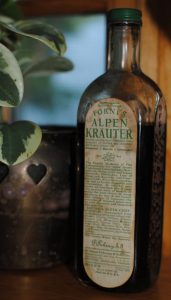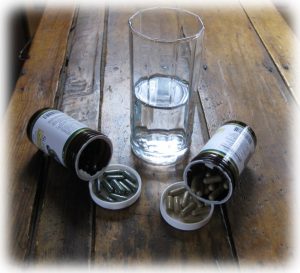- About
- Herbs
- Methods
- Issues with…
- Imbalances in…
- Client Info
- Store
How Herbs Help
What can herbs do?

An herbal digestive aide from 1920 “creates a feeling of warmth and comfort in the stomach” containing senna, fennel, mandrake root, peppermint, spearmint, mountain mint, horsemint, sarsaparilla, sassafras, hyssop, blessed thistle, ditanny, ground ivy, johnswort, lemon balm, sage, spikenard, and yarrow.
- Herbs provide important micronutrients to correct imbalances in the body and
- stimulate the self-healing process.[The technical info on all the herbs I recommend can be found here.]
All cultures have used them for these purposes with good results for thousands of years. If they were not effective, they wouldn’t have remained so popular. And people of faith might ponder this question: Would God have put us here without remedies for the illnesses He knew would befall us?
After I got well taking herbs, or at least functional, I became curious about what ‘secret ingredient’ in the supplements was responsible for what I considered a surprising and remarkable recovery from a serious condition in such a short time. I was shocked when I read the ingredients list, “Burdock, Dandelion, Chickweed… Wait!! These are weeds!! I am eating weeds ?!! ….And getting well?!!” I still recall my total disbelief as I kept searching the ingredient list for the powerful secret ingredient responsible for my healing, besides just weeds, aka herbs. My next thought was, “How can this be? Who knows about this stuff? How have I missed this?” (I have lots of education and I guess I thought someone as educated as myself would surely have heard that people can eat herbs and get well. Not so, obviously.) So I began searching out the people who knew ‘this stuff’…and the rest is history. But I am here to say, people eat herbs and get well.
Herbs are used for 3 different purposes
As you begin using and researching herbs it is helpful to observe that herbs are used in 3 general ways. None of them is a bad purpose.
1. Herbs are used like drugs, that is, to mask symptoms. No problem here as they are safer than drugs to help you feel better. In these cases, when you stop taking the herbs, your symptoms may return. Herbal antioxidants, digestive aides and pain relievers are generally used this way. Results are also seen sooner than when addressing the underlying cause (see below).
2. Herbs are used like regulators, that is, to compensate for the body’s broken self-regulating process, for example, its regulation of sugar, or hormones, or blood parameters like cholesterol, WBCs, etc. This is challenging because the intelligent body is designed to do this in the background without our conscious effort. Trying to figure out how much and at what time or under what conditions we regulate various parameters can be daunting.
3. Herbs are used like healing agents, that is, to address the underlying cause of your symptoms, to stimulate proper circulation and function of the organs/processes of the body so it can self-regulate its hormones and blood composition and resolve symptoms like pain and indigestion. Herbs that address the underlying causes take a little longer to resolve symptoms, BUT, often the many symptoms that spring from that underlying cause are all resolved in time. (As opposed to finding different herbs to mask all the symptoms that you have).
Herbs and the disease process
A disease is nothing but a collection of imbalances within the body manifesting as a set of symptoms. A specific set of symptoms gets a specific disease label, such as Parkinson’s, diabetes, cancer, MS, etc. If you correct the underlying imbalances, the symptoms diminish and the disease slips ‘into remission’.
If you are here searching for a remedy to a disease that you currently have, you do well to think about these things.
- The development of your disease was a ‘PROCESS’.
- It began with an imbalance – small at first – most likely a result of diet/stress – that did not resolve on its own. Usually these small imbalances can be corrected with food, drink or the absence thereof. (Neither OTCs nor pharmaceuticals balance the body. They suppress the warning signs, create new imbalances, prevent imbalances from being corrected, and make you worse.)
- A small imbalance (newly manifesting) corrects more quickly and more cheaply than a greater imbalance (that’s been there a long time). Therefore, always keep your problems small and address imbalances early and naturally.
- Some imbalances are genetic, so it is wise to make the right balancing herbs a habit.
- If imbalances do not self correct, they become greater imbalances.
- The body is designed to self-correct or bounce back from an insult. Thus any disease tends to get worse by an insufficiency of the innate self-recovery process. Herbs stimulate the self-recovery process in the event recovery has been stymied by stress, diet, or pharmaceuticals, etc.
- The greater the imbalance, the stronger the ‘food’ needed to correct it. Strong foods are called ‘herbs’. (You wouldn’t eat a whole tablespoon of ginger, or red pepper would you? That’s why they come in capsules.) Most botanicals that are considered ‘medicinal herbs’ are not normally found on our plates, or in our kitchens, but probably are growing in abundance all over our county or state (or even our yards in the case of dandelion and chickweed).
- The terrain of our body that supports the development of one imbalance will likely support the development of others, and, for lack of the same counter balancing or correcting foods and herbs, will support the spread of a disease process.
- Healing, or correcting imbalances, is a ‘PROCESS’ that you go through. It may require several different courses of herbs, from the strongest ones to milder ones and then to foods.
- The longer an imbalance has existed, the longer it takes to resolve it.
- You can live with an imbalance in your body because your body will try to compensate for it. You can live with even two imbalances but as they pile up, or go deeper into your body, your quality of life decreases. The people who most revere quality of life are those who have been sick and dysfunctional.
- You can even LIVE with a tumor in your body. A tumor is simply your body’s attempt to sequester damaging substances in its own penitentiary or secure jail. As long as the body is not adding to it, and you have compensated for the underlying imbalance, you may need to LIVE WITH IT. LIVE. Got it? LIVE. Go about your business and monitor it, and focus on living. If a doctor has given you the death sentence, ignore it. He is NOT God, and God can prove that to you. If you have something to live for – you can!
So simply put: Herbs correct imbalances in the body.
However, there are times when herbs may not be able to help.
Index for this Post
Consider this…..
I have learned more from very sick people than I have from double-blind, placebo-controlled, cross-over studies. My sick clients taught me how to get them well - things that even my teachers didn't know. I have such smart clients.
** Important Warning **
Nothing on this site is FDA approved. Nothing I write here is intended to be medical advice. Follow my recommendations at your own risk. Results may vary, and blah, blah, blah. So if the required warnings have not scared you away, then you have a chance. I'm reporting here what kinds of approaches actually helped very sick people get well, AND the kinds of things that actually made them sick (and it usually isn't lack of exercise, weight, menopause or smoking - it is the underlying cause of all those things.)
** Important Posts **
- ► I Went to the Doctor and the Doctor Said…
- ► THE Technical Info on the Herbs
- ► Uh oh, what was I supposed to do when I think I’m getting sick?
- ► Fatigue: The Mother of All Disease
- ► Uh oh, my kid is sick again
- ► Childhood Disorders (ADHD, Behavior Disorders, etc.)
- ► Too Busy to do Healthy
- ► Of Drugs, OTCs and Black Electrical Tape
- ► Pat’s book – Spiritual Disciplines for Physical and Emotional Healing
In case you were wondering..
B=Breakfast, L=Lunch, D=Dinner, b=bedtime. Make sure to read What to Expect on an Herbal Program (in the Herb menu) before beginning. Dosages given are about what my clients benefit from. You may be different. Begin slowly and see how each recommendation benefits you.** Join the Discussion **
This website is a work in progress and a sharing tool. Feel free to use the comment forms to share your tried and true 'something natural'.




